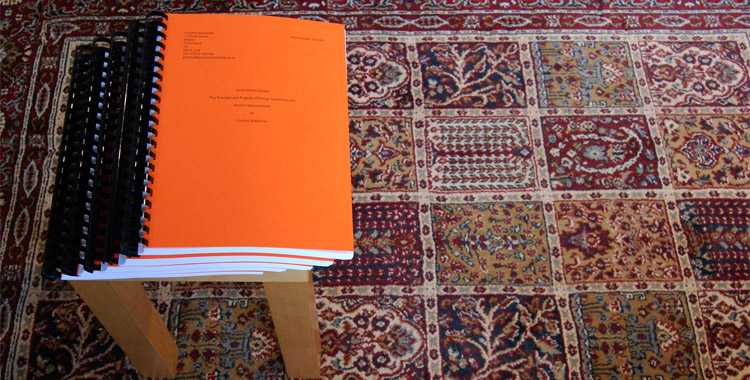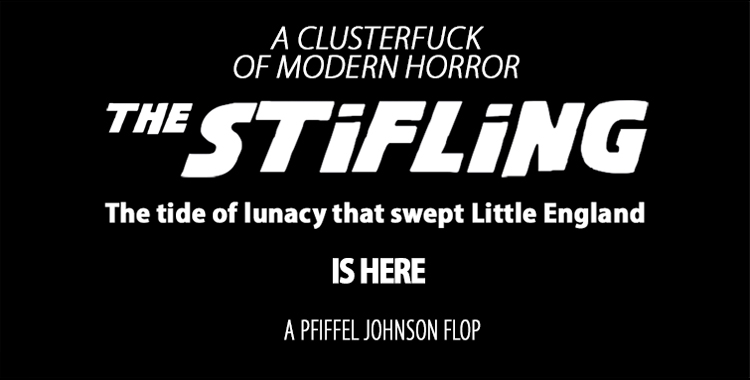I have recently been looking back at some of the books on the craft of writing that I have accrued over the last forty years – an exercise I believe any writer must undergo regularly and will surely benefit from. The point is that, as with any deeply complicated skill, from editing a movie to working with computer code, from rock climbing to playing the piano, you never stop learning.
One of the first books I read on the subject of writing, many years ago, was also one of the first of its kind, the ground-breaking The King’s English by H.W. & E.G.Fowler of 1906. (In such high esteem is this and their later Modern English Usage held that their work is invariably referred to simply as ‘Fowler’.)
In The King’s English, Fowler comes straight to the point. ‘Any one who wishes to become a good writer should endeavour, before he allows himself to be tempted by the more showy qualities, to be direct, simple, brief, vigorous and lucid.’ He then lists his famous five ‘general rules’ (‘in order of merit; the last is also the least.’)
He emphasises that his ‘cry’ for Saxon English is ‘nothing more than a demand for plain and unaffected diction’ rather than ‘words of learned length and thundering sound.’ He then gives an example of a phrase that manages to break all five rules: in the contemplated eventuality – which is ‘at once the far-fetched, the abstract, the periphrastic, the long, and the Romance, for if so.’
Arguably the next great landmark in monographs about writing came in 1946 with George Orwell’s classic essay, ‘Politics and the English Language’. His main targets in this rather fierce polemic were ‘staleness of imagery’ and ‘lack of precision’. He was particularly concerned about the travesties to be found in political writing, which he said typically ‘consists less and less of words chosen for the sake of their meaning, and more and more of phrases tacked together like the sections of a prefabricated hen-house.’ This very important criticism is of course one that can be applied to all bad writing.
Orwell updated Fowler’s five rules with six of his own:
Next, possibly influenced by Orwell’s essay, Sir Ernest Gowers wrote, in 1948, Plain Words (revised in 1954 as The Complete Plain Words – but I still have my grandfather’s original 1948 edition.) This classic work took up the gauntlet against jargon and vacuous verbosity in exhaustive detail. The basic principle underlying all writing, Gowers said, is ‘to convey our meaning without ambiguity and without giving unnecessary trouble to the reader.’ He then drew up his own list of just three ‘rules’:
Use no more words than necessary to express your meaning…. In particular do not use superfluous adjectives and adverbs, and do not use roundabout phrases where single words would serve.
Use familiar words rather than the far-fetched …
Use words with a precise meaning rather than those that are vague … in particular prefer concrete words to abstract …
Note that the second and third rules are straight from Fowler. But, but in case he should appear too proscriptive, Gower concluded with a further very important proviso, a reminder that:
“Good English” consists less in the observance of grammatical pedantries than in a capacity to express oneself simply and neatly.
And this leads me to the main purpose of this blog, a plea for writers and editors not to become swept along in a rut of pedantry, and so succumb to a regimen of dull and lifeless orthodoxy. For there is a real risk that they forget what is most important of all in writing. To paraphrase a reason Stanley Kubrick would often reject ideas in movies – ‘It’s real but it’s not interesting’ – we could say ‘Yes, it’s clear and unambiguous, but it’s dull and uninteresting.’ (I shall conclude this rather long blog by saying what I think makes writing of whatever subject or genre interesting beyond the ideas that it contains.)
Some more recent works on the craft of writing, admirable in many ways, fall into the trap of pedantry, I think. William Strunk and E.B.White’s classic Elements of Style (1959), regarded by many as a kind of bible, but by others as ‘bossy’ and ‘atavistic’, takes up the great cry of ‘Omit needless words’ perhaps a little too stridently (the use of the adverb now being regarded as almost unpardonably amateurish). Though what they say later in the book about style is very important and I shall come back to in a later blog. Similarly, in the otherwise excellent On Writing Well (1976) – which I’m sure I’ll also be returning to in future blogs – William Zinnser, taking Thoreau’s famous slogan ‘Simplify, simplify’, possibly exaggerates the extent to which many books can be pruned. ‘Most drafts,’ he claims, ‘can be cut by 50 percent without losing information or losing the author’s voice.’ With his students, he says, he doesn’t cross out words, but puts them in brackets so that they can think how best to re-write their work (simple cutting not always being the best solution.) Sometimes ‘entire paragraphs were bracketed.’
I’ll have to confess that a naughty urge overcame me at this point, and I put cheeky brackets around the second use of ‘losing’ in the sentence quoted above.
And then: ‘Simplify, [simplify].’
But an important point lurks here, though Zinnser himself perhaps misses it. While it’s certainly true that a majority of sentences can be tightened up when editing a first rough draft, by the time a completed and polished first draft reaches an agent or publisher this is not the case. It is then often a matter of cutting out whole paragraphs, section of chapters, or even whole chapters.
There are many similarities with movie-making here. Typically, the first ‘rough cut’ of a movie is not at all ‘rough’. The edits, while many can be improved and tweaked, always have to be well crafted from the outset because a scene just will not work if it’s badly cut. Often what happens in producing a final cut (sometimes even after it’s been seen by a preview audience) is that whole scenes, or sections of scenes, will be cut. The ability of a movie audience, like a reader, to infer what has happened between key scenes should never be underestimated.
I’m also reminded of the way my excellent history master at school, a Mr. Parker, whom I hated at the time but have been grateful to ever since, marked history essays. In particular, he disdained introductory or linking paragraphs. He would invariably cross out any such paragraphs and put ‘waffle’ in the margin. Otherwise, when what one had written was not strictly relevant, the margin would be littered with ‘Ans the Q’. Apart from that, the only marks in the margin would be very small ticks every time one made a point that directly answered the essay question. And the marks out of 20 that one received for the whole essay were quite simply the number of ticks in the margin. I always found it desperately difficult to get more than the pass mark of 9, typically scoring about 11 or 12, and probably never got more than a 15. (Also, even more damning, if I scored 9 or 10, would be the comment ‘See Ziegler’s’ across the top of the essay, meaning see the essay written by the top boy in the class who always, rather nauseatingly, scored about 19 or 20.)
I learned an awful lot from Mr. Parker, not just about writing essays but about writing in general. But of course there is much more to writing than just the nuts and bolts of syntax, relevance, clarity and concision. All too easily another important element is forgotten. Which brings me back to where I started, to Fowler.
Many people who have read The King’s English forget that, while Part 1 is all about vocabulary, syntax, punctuation, ‘archaisms’, and bad style (‘airs and graces’, ‘dead or elaborate metaphors’, ‘cheap originality’, and so on), Part 2 starts with a long section on ‘Euphony’. So out of fashion is this term that many people reading this blog will I’m sure run for the dictionary.
‘The quality of being pleasing to the ear.’ This essential ingredient, which was so well understood by all the greatest writers from Jane Austen to Dickens, from Dylan Thomas to the greatest master of them all, the bard of Stratford. All great writing must not only be clear in meaning, but a pleasure to read. Which depends not just on being entertaining, but on being the crafted with what Zinnser calls ‘a good musical ear’. One could call this ‘the poetry of the language’, which all depends on the sounds, the timing, and the rhythm of the words.
Fowler, however, treats euphony in minimal, negative terms: that is, as the quest of avoiding ugliness. His whole message may be summed up by saying that the writer has the dual task of avoiding ‘formations’ that are either ‘needless’ or ‘ugly’. He singles out ten kinds of ugliness in writing: things such as ‘jingles’, alliteration, repeated prepositions, repetition of relatives and other conjunctions, and ‘metrical prose’. ‘The novice,’ he warns sternly, ‘should watch narrowly for metrical snatches in his prose; they are a sure sign that the fit is on him’; and he is scathingly critical of an example he’s found in Ruskin, adding metrical lines to exacerbate his point:
And the gathering orange stain/ upon the edge of yonder western peak,/ reflects the sunsets of a thousand years.
Of course, Charlotte Bronte or Dylan Thomas or Dickens or Hardy would have got nowhere if they had taken heed of Fowler’s warning. And Shakespeare of course was always doing much more than simply ‘avoiding ugly formations’. The very opposite.
So my final plea to fellow writers is to strive not only to avoid, with Fowler, ‘needless and ugly formations’, but to create works of beauty that are pleasing to the ear. And this often means ignoring the so-called rules of the (ever more prevalent) pedantic editor.
I shall finish with one final example of such pedantry. In another recent book on writing, Self-Editing for Fiction Writers by Renni Browne and Dave King (1993), that is very useful and commendable in many ways, I came across one quite extraordinary unwarranted new ‘rule’:
Place the character’s name or pronoun first in a speaker attribution (“Dave said”). Reversing the two (“said Dave”), though often done, is less professional. It has a slightly old-fashioned, first-grade-reader flavor.
What is particularly odd about this prohibition is that their model of authorial perfection, F. Scott Fitzgerald, does not follow their advice at all. It’s as if they haven’t read the passage from The Great Gatsby that they placed approvingly at the front of their book at all closely. Of the seven speaker attributions in the passage, over half of them, four, are reversed (the second, third, fifth and seventh – i.e. they are used more or less alternately). This is all because Scott Fitzgerald, crucially, has an ear for cadence and rhythm.
I see that I broke the same rule (before I’d come across Browne & King) in the very first piece of dialogue in my book Fiva: An Adventure That Went Wrong. It comes on the second page, immediately after my twin brother and I have committed ourselves to climbing a very long and dangerous rock climb in Norway (‘the moment of no return’):
‘“OK?” I say.
“Yes,” says John.’
This for me, when I wrote it, was all a matter of rhythm, how it sounds. Just try reversing ‘says John’ and see how ugly it sounds. The way I wrote it had another rather more subtle advantage: it seemed a very appropriate way of mimicking on the page one twin facing the other, and having what he had just said coming back in mirror-image, as it were. The cadence also had the benefit of sealing the exchange with a suitable crunch of finality.
But these are exactly the kind of nuances that are so often missed by the new breed of over-pedantic literary editor.
The second half of this essay on the fundamentals of writing, ‘Style and Eloquence’, will follow shortly.







1 thought on “On Pedantry versus Euphony”
Moderator of this website testing the website’s reply system
Comments are closed.